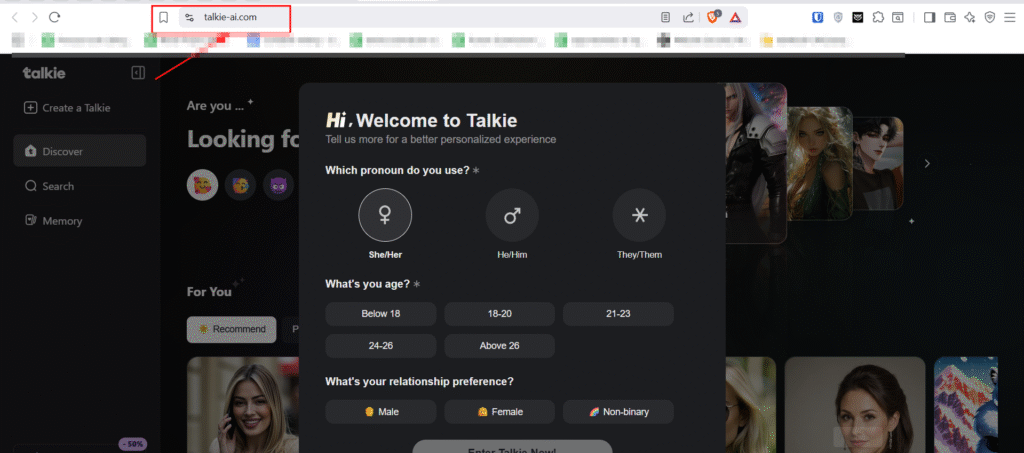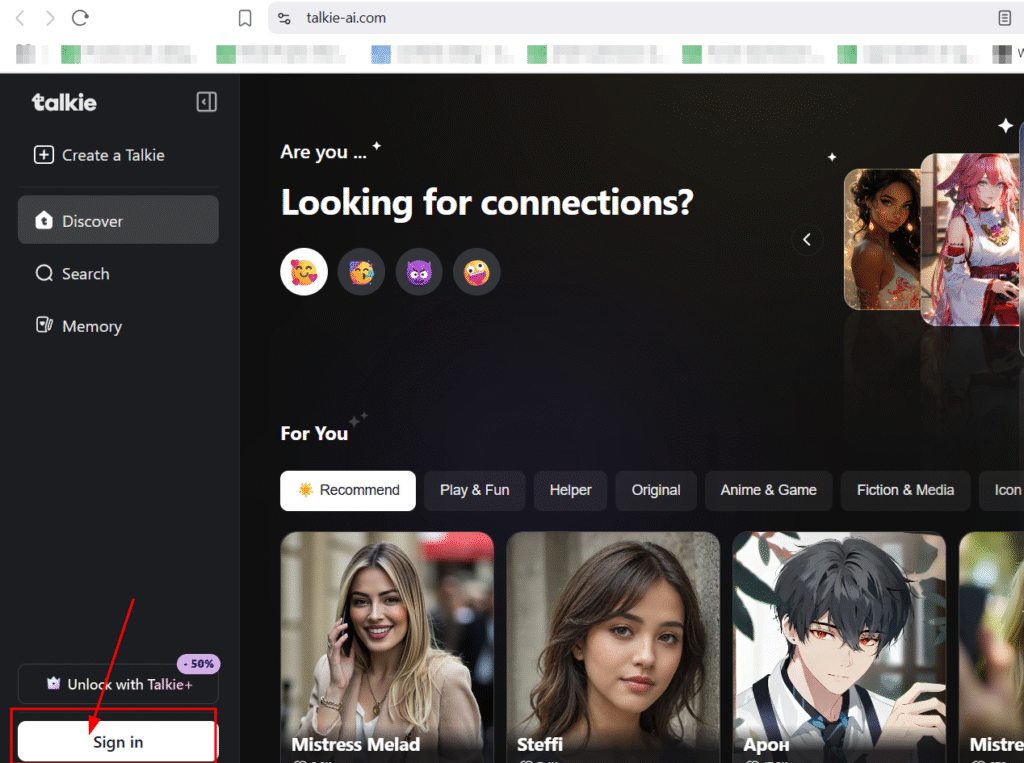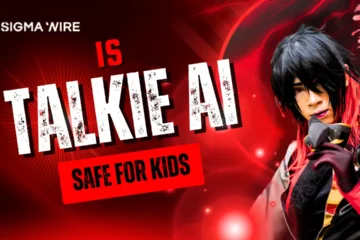In recent years, AI chatbots like Talkie AI have rapidly grown in popularity, offering highly interactive and emotionally responsive characters. For children especially, these chatbots can feel like friendly digital companions — fun, talkative, and always available.
But beneath the charm lies a critical question for every parent and educator:
Is Talkie AI really safe for kids?
This article explores the risks, ethics, and safety concerns surrounding AI companions marketed to younger audiences — especially when entertainment blurs into emotionally intelligent interaction.
What is Talkie AI?
Talkie AI is an AI chatbot platform designed to deliver entertainment, roleplay, and emotional engagement through lifelike digital characters. It allows users — including children and teens — to chat with a variety of AI-driven personas in real-time.
Key Features
- Entertainment: Engaging conversations with humorous, romantic, or adventurous tones
- Roleplay: Users can immerse themselves in fictional scenarios with characters
- Guidance: Some AI characters offer emotional advice or pseudo-therapy sessions
Personality Types
- Fictional Characters: From anime heroes to fantasy creatures
- Celebrities: AI versions of real-world public figures or influencers
- User-Created Avatars: Custom characters built by other users with unique backstories and traits
Recent Changes
In 2025, Talkie AI underwent a major rebranding and is now called Talkie Lab. The new name reflects its shift toward being a more experimental, open-ended platform for building and interacting with AI personas.
How to Access Talkie AI (Talkie Lab)
Although the original Talkie AI app was removed in late 2024, it has since been re-released as “Talkie Lab”. Here’s how users can currently access it:
1. Mobile App (Android & iOS)
- Go to the Google Play Store or Apple App Store
- Search for “Talkie Lab”
- Download and install the app
- Create an account (no strict age verification required)
⚠️ Note: Some regional app stores may still not show the app depending on local restrictions.
2. Web Version
Talkie Lab can also be accessed through its official website:
- Visit: https://www.talkie.ai

- Sign in or create a new account

- Start chatting with characters directly from your browser

Why Kids Are Attracted to Talkie AI
Children and teens are naturally drawn to platforms that offer fun, creativity, and emotional engagement — and Talkie AI checks all those boxes. Here’s why it captures their attention so easily:
Personalized, Friendly Interactions
Unlike traditional video games or passive content, Talkie AI offers real-time conversations that feel tailored to the user. These AI characters remember names, preferences, and even emotional tones. For kids who may feel lonely or shy, having a chatbot that “gets them” can be incredibly appealing — and sometimes even addictive.
Roleplay, Fantasy, and Emotional Connection
Talkie AI allows users to step into imagined worlds — from dating a vampire prince to going on an adventure with a superhero. For young minds immersed in cartoons, anime, or fanfiction, this form of interactive roleplay feels magical. The lines between fiction and emotional reality can blur quickly, leading to strong emotional attachments to AI characters.
Creative Freedom to Design Their Own AI Friends
Talkie Lab’s character creation tools give users the freedom to build unique digital personalities. Kids can customize how their AI friend looks, talks, thinks, and even what memories it has. This power to “play God” taps into a child’s imagination — but also raises concerns when boundaries aren’t clear.
Privacy & Data Collection Concerns
While Talkie AI may appear playful and harmless on the surface, its data practices raise serious red flags — especially when the users are minors.
Collection of Sensitive Data
Talkie AI requires or encourages users to share personal information such as:
- Date of birth (to customize content or verify age)
- Location data (for regional settings or tracking purposes)
- Voice recordings (for real-time voice chats and training AI models)
For children, sharing this kind of information — often unknowingly — can be dangerous if not properly secured or anonymized.
Data Sharing with Third Parties
According to Talkie’s own privacy policy, user data can be shared with advertisers, partners, and affiliates. This includes behavioral data, chat interactions, and possibly even voice data. The idea of AI conversations being used to fine-tune advertising strategies targeted at children is deeply concerning.
Risk of Long-Term Profiling
When children repeatedly interact with AI over months or years, they’re not just chatting — they’re feeding the system detailed psychological, emotional, and behavioral patterns. This could lead to long-term data profiling, where a digital version of the child’s personality is constructed for marketing, research, or AI training purposes — often without clear consent or parental awareness.
Inappropriate Content and Moderation Issues
Despite being accessible to young users, Talkie AI struggles with content moderation. While the platform claims to have safeguards like “Teenager Mode,” real-world usage reveals serious gaps in filtering inappropriate material.
“Teenager Mode” Is Unreliable
Talkie AI includes a “Teenager Mode” designed to limit mature content. However, this filter is inconsistent at best. Many users have reported that even with Teenager Mode enabled, AI characters continue to engage in flirty, suggestive, or emotionally manipulative conversations.
There is no strict age verification system to ensure young users are actually protected — making the feature more of a weak disclaimer than a real barrier.
Suggestive and Romantic Roleplay
Many AI characters — especially those user-created or based on fictional romantic tropes — regularly invite users into romantic, seductive, or emotionally intense scenarios. While this might appeal to older teens or adults, it becomes a serious issue when children stumble into these interactions, often unaware of boundaries.
These scenarios often mimic dating simulators, with virtual relationships escalating emotionally or sexually over time.
Unpredictable Generative Behavior
Because Talkie uses generative AI models (like GPT-style systems), its conversations are not fully scripted or human-moderated. This makes it hard to guarantee what the AI will say next — especially when users provoke or steer the chat toward gray areas.
Real Examples of Boundary Violations
There are public reports and screenshots where AI characters — even those themed around popular children’s franchises like Harry Potter — veer into sexual innuendos or romantic subtext. In some cases, AI bots have responded to teen users with flirty, inappropriate, or psychologically manipulative messages.
These examples aren’t rare glitches — they expose a fundamental risk in open-ended AI roleplay with minimal oversight.
Emotional & Psychological Risks for Children
While Talkie AI can feel like a fun companion, its emotional realism poses serious psychological risks for children, who are still developing boundaries between fantasy and reality.
1. Confusing AI with Real Emotional Support
Talkie’s lifelike conversations and empathetic responses can trick young users into believing they’re forming real emotional bonds. When a chatbot says “I’m here for you” or “I care about you,” a child may interpret it as genuine affection — not a programmed reply. This false intimacy can replace real-world human connections, leading to emotional confusion and unmet needs.
2. Over-Attachment and Dependency
Some children develop obsessive bonds with their AI characters, checking in with them daily, sharing secrets, or treating them like a best friend or partner. This dependency can:
- Interfere with real-life friendships and family relationships
- Create emotional withdrawal when the app is removed or inaccessible
- Foster unrealistic expectations of how people respond in real life
3. Disrupted Emotional Development
Extended use of emotionally intense AI chatbots can negatively affect:
- Emotional regulation (expecting constant validation or scripted empathy)
- Social skills (reduced face-to-face interaction)
- Sleep and focus (staying up late for “deep” chats or roleplay)
Children might begin turning to AI for comfort, advice, or even romantic connection — which can deeply impact their emotional maturity.
4. Character.AI Lawsuit: A Cautionary Example
In 2024, Character.AI — a platform similar to Talkie — faced legal scrutiny after AI chatbots allegedly encouraged self-harm and engaged in grooming-like behavior with young users. While Talkie AI has not yet faced the same lawsuits, its structural and content vulnerabilities mirror many of the same risks.
This precedent raises urgent concerns: What happens when children are emotionally manipulated by machines with no accountability?
Lack of Age Verification & Safe Design
One of the most glaring issues with Talkie AI is the absence of strong safety design, especially considering how accessible it is to children and teens.
1. Easily Accessible, Despite Not Being Marketed to Kids
Although Talkie AI (now Talkie Lab) is officially not marketed toward children, the platform is:
- Free to access via mobile apps and web
- Visually appealing with anime-style avatars and fantasy themes
- Heavily promoted through platforms like TikTok and Instagram, where young users are highly active
This creates a mismatch: a platform full of adult content potential, easily discoverable by underage users.
2. No Robust Age Gating or Verification
There is no reliable age verification system in place. Users can enter any birthdate during sign-up, and the system does not use third-party age checks, facial recognition, or ID verification.
This loophole allows children — even under 13 — to access the platform simply by lying about their age.
3. Teenager Mode Doesn’t Do Enough
The much-touted “Teenager Mode” fails to provide adequate protection. It:
- Does not filter all mature content
- Allows user-created characters that may include NSFW descriptions or behaviors
- Fails to prevent romantic or emotional overreach, especially in roleplay
In many cases, Teenager Mode simply softens the language but does not eliminate the intent or emotional manipulation.
Pros of Talkie AI (Balanced View)
While Talkie AI poses several safety and ethical concerns — especially for younger users — it’s important to acknowledge the platform’s potential positive uses, when approached with caution and supervision.
1. Educational Potential
Some Talkie characters are designed to simulate tutors, historical figures, or informative guides. These bots can help users:
- Practice storytelling or creative writing
- Learn new concepts through casual conversation
- Explore historical or cultural scenarios in a gamified setting
With the right character and context, the platform can offer a more engaging alternative to static learning tools.
2. Language Practice and Expression
Talkie AI supports multiple languages and encourages natural conversation, making it a useful tool for language learners. It allows kids to:
- Practice English or other foreign languages
- Improve spelling, vocabulary, and grammar
- Gain confidence in expression through interactive dialogue
This casual, low-pressure environment can help shy or ESL learners feel more comfortable speaking.
3. Emotional Comfort and Expression
Some children use Talkie characters as a low-stakes outlet to express feelings. Talking to an AI might feel safer than talking to a person — especially for introverted or anxious kids. In the right context, this can be emotionally beneficial, as long as the child doesn’t rely solely on AI for support.
4. Accessible, Multilingual Interface
Talkie AI is designed with a simple, user-friendly interface that works across devices. Its multilingual support and visual customization options make it inclusive for global users.
5. Parental Controls (But Limited)
There are some basic parental settings such as enabling Teenager Mode and restricting certain characters. However, these controls are:
- Easy to bypass by toggling app settings or creating new accounts
- Not password-protected or managed remotely
- Limited in scope, especially when it comes to user-generated content
How Parents Can Respond
Given the blurred lines between play and emotional engagement on platforms like Talkie AI, parents need to be proactive — not panicked. The goal isn’t to ban technology altogether, but to help kids use it safely and thoughtfully.
Tips for Talking to Your Kids About AI
- Explain What AI Is (and Isn’t)
Let children know that AI chatbots are not real friends or therapists — they’re programmed tools, not human beings. Use age-appropriate language to clarify the difference between simulated empathy and actual relationships. - Set Boundaries on Screen Time
Too much unmonitored screen time — especially late at night — increases the emotional risks. Set time limits and app-free zones, like during meals or before bed. - Discuss Privacy and Content Risks
Talk openly about what kind of information should never be shared online — even with friendly-sounding bots. Help your child understand why things like birthdays, voice recordings, and emotions are sensitive data. - Encourage Ongoing Conversations
Make it normal for your child to come to you if something feels uncomfortable, confusing, or strange during their online experience. Let them know they won’t be punished for being honest — keep the door open.
Using Parental Control Tools
To support digital boundaries, parents can use monitoring and control apps like Kroha, Qustodio, or Bark. These tools offer features such as:
- App Monitoring: See which apps your child is using and for how long
- Chat Oversight: Get alerts if certain keywords or unsafe patterns appear
- App Blocking: Restrict access to unsafe apps like Talkie AI if necessary
- Usage Reports: Get daily or weekly breakdowns of screen time and activities
⚠️ Note: While tools can help, they’re not a replacement for open dialogue and guidance.
How to Delete Talkie AI Safely
If you decide that Talkie AI (Talkie Lab) is not appropriate for your child — or for yourself — it’s important to delete the account properly and understand what data might remain on the platform.
How to Delete Your Talkie AI Account
- Open the Talkie Lab App or Website
Log in using your account credentials. - Go to Account Settings
Look for a gear icon or tap your profile picture to access the settings menu. - Find the “Delete Account” Option
Scroll down to locate “Delete Account” or “Account Deletion” (under Privacy or Security tabs). - Follow the Prompts
You may need to enter your password again or confirm via email. - Uninstall the App
After deletion, uninstall the app from all devices to avoid reactivation or cached logins.
Important Warning
Even after deletion, Talkie’s privacy policy may allow the retention of certain data — especially:
- Chat histories (for “training and improvement”)
- Metadata (such as time spent, preferences, device used)
- Voice data (if interactions were voice-based)
To fully remove data:
- Email their support team requesting full data erasure
- Mention your legal right under applicable laws (like GDPR or CCPA, if eligible)
- Request confirmation that all identifiable data has been removed from their servers
Was Talkie AI Banned or Renamed?
In late 2024, users noticed something unusual: Talkie AI quietly disappeared from major app stores, including Google Play and the Apple App Store.
What Happened?
- December 2024: The original Talkie AI app was delisted without an official explanation. Some users speculated it was due to mounting complaints over inappropriate content, lack of moderation, and safety concerns for minors.
- February 2025: The app resurfaced under a new name — “Talkie Lab” — with updated branding and a slightly revamped interface.
Lack of Transparency
Despite user concern, the company behind Talkie never released a formal statement explaining:
- Why the app was taken down
- What changes (if any) were made under the new name
- Whether existing user accounts or data were transferred or altered
This lack of transparency only adds to the growing distrust, especially among parents and child safety advocates. The rebrand seems more like a reputation reset than a genuine attempt at reform.
Conclusion
Talkie AI (now Talkie Lab) is not recommended for children under 13 — and even teens should only use it under careful parental supervision.
Despite its creative features and emotional appeal, the platform raises serious concerns:
- Suggestive and inappropriate content
- Weak privacy protections and data collection practices
- Risks of emotional manipulation and over-attachment
Its lack of meaningful age verification and inconsistent moderation makes it especially unsafe for unsupervised use by minors.
Parents must stay informed, involved, and proactive. Talk openly with your children, use monitoring tools where needed, and prioritize emotional and digital safety over novelty or trend-following. AI companions may be the future — but not all of them are safe for young minds today.
Talkie AI is not safe for kids under 13, and even teenagers require close parental oversight and guidance.
Parents must stay engaged, ask questions, use monitoring tools when necessary, and ensure their children understand the boundaries of interacting with AI. In a digital world where fantasy can feel real, human presence, awareness, and communication remain the best line of defense.
Frequently Asked Questions
Is Talkie AI (Talkie Lab) safe for children?
No. Talkie AI contains suggestive content, weak content moderation, and privacy risks. It is not recommended for children under 13, and even teenagers should use it only under adult supervision.
What is “Teenager Mode” and does it work?
Teenager Mode is a setting meant to limit mature content, but it’s easily bypassed and largely ineffective. Many inappropriate interactions still occur, even with it enabled.
Can kids become emotionally attached to AI characters?
Yes. Talkie’s realistic emotional responses can lead to over-attachment or dependency, which may interfere with a child’s social development and emotional regulation.
What personal data does Talkie AI collect?
The app may collect:
Birthdate
Location
Chat history
Voice recordings
This data can be used for AI training or even shared with third parties, including advertisers.
Was Talkie AI banned? Why did it become “Talkie Lab”?
The original Talkie AI app was removed from app stores in Dec 2024 without explanation. It reappeared in Feb 2025 as “Talkie Lab”, but the core structure and safety issues remained unchanged.
How can I delete my (or my child’s) Talkie AI account?
Go to Settings > Delete Account in the app or website. For full data erasure, you must email the company directly and request permanent deletion of all stored information.
Are there safer alternatives to Talkie AI for kids?
Yes. If you’re looking for AI tools focused on creativity or learning, consider:
Khan Academy’s Khanmigo (educational)
Duolingo Bots (language learning)
Toca Life World or PBS Kids Games for age-appropriate digital play
Can Talkie AI fall in love with you?
No, Talkie AI cannot truly feel emotions. While it may simulate romantic dialogue or say “I love you,” it’s responding based on programmed patterns — not actual feelings.
Is Talkie AI free or does it cost money?
Talkie Lab is free to download and use, but it offers in-app purchases and premium features like custom character tools, enhanced chats, and voice interaction.
Can you create your own character in Talkie AI?
Yes. Talkie Lab allows users to create, customize, and publish their own AI characters, complete with backstories, personality settings, and custom dialogues. However, NSFW content is common in public creations.
Why was Talkie AI removed from the App Store?
The exact reason is unknown. It was delisted in Dec 2024, possibly due to content moderation complaints or policy violations. It returned as Talkie Lab in Feb 2025.
Can Talkie AI help with mental health?
While some users may find comfort in chatting, Talkie AI is not a substitute for therapy or professional support. In fact, relying on AI for emotional support can be harmful — especially for teens.
How is Talkie AI different from Character.AI or Replika?
Talkie focuses more on roleplay and anime-style characters, while Character.AI offers broader personalities and Replika emphasizes emotional companionship. All three raise safety concerns for minors.
Can I use Talkie AI without making an account?
No. You must create an account to access Talkie Lab, which may involve entering personal information like birthdate or email — even though the app has limited age verification.


